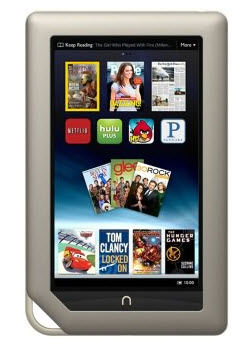Why you may never see Windows Phone on the Nook

Microsoft has thrown $300 million at book giant Barnes & Noble to buy itself the Nook e-book business. Does this mean we can expect to see a Nook sporting the Windows Phone operating system any time soon?
I doubt it.

Don't get me wrong, a Nook with a Windows Phone operating system -- or some variant of Windows 8 for that matter -- would make for an interesting device. My inner-geek is certainly interested. The Nook is already solid, well-made bit of kit.
While it isn't in the same league as Apple's iPad -- because nothing is -- or Amazon's Kindle Fire tablet for that matter, it's still a very capable tablet. Judging by the reviews people like it a lot. Closer integration with the Windows ecosystem, on both the desktop and on mobile devices, would certainly open up some new and exciting possibilities for the device.
At first blush, a Windows-powered Nook makes sense, but there are huge obstacles: technical, business and social -- in the way that means this is unlikely to happen.
Let's start with the technical reasons. There's no doubt that the Nook would need a serious overhaul before receiving the new operating system. All product redesigns -- even very basic ones -- come with a significant dollar value attached to them, and a platform switch would be a huge redesign. Not only that, but changing the operating system would draw a line under the Nook's ability to dip into to the Android ecosystem for apps and instead make owners reliant on Microsoft's much smaller app ecosystem.
Any change in platform would also mean that current Nook owners would lose access to any apps they purchased for the Android Nook once they upgraded to a Windows-powered Nook. In my experience, this is exactly the sort of thing that annoys people who have bought into a platform. Tinkering with the Nook at this stage just for Microsoft's benefit could be bad for the Nook. And what's bad for the Nook is good for the likes of Amazon.
Then there's the price. The Nook currently sells for $199 for the 8GB model and $249 for the 16GB model. While the current hardware might be capable enough for the Windows Phone operating system, I'm doubtful that it would be good enough to run Windows RT, which is why I think it is unlikely that we will see a Windows Phone powered Nook at all. I doubt that a $200 Windows RT tablet is possible at this stage, unless it is heavily subsidized. Increasing the price of the Nook would certainly reduce its appeal, while a subsidy would mean having to claw cash back through content sales.
From the business side of things, we need to consider that Microsoft isn't going to supply a version of Windows for use on the Nook at no cost at all. It's not how Microsoft does things, and even if it did, doing so would seriously upset other hardware OEMs. Whether the Nook runs Windows or Android, Microsoft still gets a cut from every sale, and that cost will form part of the overall cost of the device.
It's also worth bearing in mind that Microsoft hasn't yet allowed the Windows Phone operating system to be loaded onto any non-phone device. This is where Windows, along with the new Windows RT operating system, comes in. Microsoft has made it clear that Windows Phone is for phones, and since the Nook isn't a phone, unless there's been a radical shift in policy over in Redmond it's never going to get the Windows Phone treatment.
Finally, there are the social issues to consider. The Nook may well be a well-loved device, with about 60 percent of owners giving it a 5-star rating. Popularity is something that you mess with at your peril, and deciding on a whim to change the Nook's operating system -- which, judging from the reviews people seem to like -- could have an adverse effect on how it's received.
After a quick scan of the 1,300 or so customer reviews on Barnes & Noble, I haven't come across a single person who thinks the Nook would be better if it ran the Windows Phone or Windows RT operating system.
Despite Microsoft throwing an alleged billion dollars at Nokia to build Windows Phone handsets, its mobile platform hasn't gained significant traction yet -- certainly nowhere enough to propel it into the forefront of Nook owner's minds.
My feeling is that this Microsoft--Nook partnership has less to do with Windows and more to do with getting a foothold into the e-book ecosystem and leveraging some of that Android--Linux related intellectual property that Microsoft has at its disposal.
It's possible that Microsoft has a vision for a unified ecosystem at some point down the line, but right now, it makes more sense for the company to stick with Android.
Image credit: Barnes & Noble.
Related: